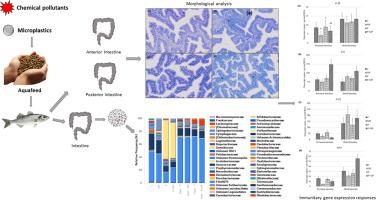Science of the Total Environment ( IF 8.2 ) Pub Date : 2021-09-16 , DOI: 10.1016/j.scitotenv.2021.150402 Daniel Montero 1 , Simona Rimoldi 2 , Silvia Torrecillas 1 , Jorge Rapp 3 , Federico Moroni 2 , Alicia Herrera 3 , May Gómez 3 , Álvaro Fernández-Montero 1 , Genciana Terova 2

|
Plastic pollution has become a global problem for marine ecosystems. Microplastics (MPs) are consumed by several marine organisms, including benthic and pelagic fish species that confuse them with food sources, thus contributing to bioaccumulation along the food chain. In addition to structural intestinal damage, ingestion of MPs represents a pathway for fish exposure to potentially hazardous chemicals, too. Most of them are endocrine disrupters, genotoxic or induce immune depression in fish.
Accordingly, we assessed the combined toxicological effects of microplastics (MPs) and adsorbed pollutants by adding them to marine fish diet. European sea bass (Dicentrarchus labrax) juveniles were fed for 60 days with feeds containing polypropylene MPs, either virgin or contaminated with chemical pollutants (a blend of dichlorodiphenyldichloroethylene, chlorpyrifos, and benzophenone-3). The data demonstrated a synergic action of MPs and chemical pollutants to induce an inflammatory-like response in distal intestine of sea bass as shown by the up regulation of cytokine il-6 and tnf-α expression. Morphological analysis detected the presence of a focus of lymphocytes in anterior and posterior intestinal segments of fish fed with contaminants in the diet. With regard to microbiota, significant changes in bacterial species richness, beta diversity, and composition of gut microbiota were observed as a consequence of both pollutants and polluted MPs ingestion. These perturbations in gut microbial communities, including the reduction of beneficial lactic acid bacteria and the increase in potential pathogenic microorganism (Proteobacteria and Vibrionales), were undeniable signs of intestinal dysbiosis, which in turn confirmed the signs of inflammation caused by pollutants, especially when combined with MPs. The results obtained in this study provide, therefore, new insights into the potential risks of ingesting MPs as pollutant carriers in marine fish.
中文翻译:

聚丙烯微塑料和化学污染物对欧洲鲈鱼(Dicentrarchus labrax)肠道微生物群和健康的影响
塑料污染已成为海洋生态系统的全球性问题。微塑料 (MP) 被多种海洋生物消耗,包括将它们与食物来源混淆的底栖和中上层鱼类,从而导致食物链中的生物积累。除了结构性肠道损伤外,摄入 MP 也是鱼类接触潜在危险化学品的途径。它们中的大多数是内分泌干扰物,具有遗传毒性或诱导鱼类免疫抑制。
因此,我们通过将微塑料 (MPs) 和吸附污染物添加到海洋鱼类饮食中来评估它们的综合毒理学效应。欧洲鲈鱼 ( Dicentrarchus labrax ) 幼鱼用含有聚丙烯 MPs 的饲料喂养 60 天,这些聚丙烯 MPs 要么是原始的,要么被化学污染物(二氯二苯二氯乙烯、毒死蜱和二苯甲酮的混合物)污染。数据表明 MP 和化学污染物的协同作用在鲈鱼的远端肠道中诱导炎症样反应,如细胞因子il-6和tnf-α的上调所示表达。形态学分析检测到在饲料中摄入污染物的鱼的前肠和后肠段中存在淋巴细胞焦点。关于微生物群,由于摄入污染物和受污染的 MPs,观察到细菌物种丰富度、β 多样性和肠道微生物群组成发生显着变化。肠道微生物群落的这些扰动,包括有益乳酸菌的减少和潜在病原微生物(变形杆菌和弧菌)的增加,是肠道菌群失调的不可否认的迹象,这反过来又证实了污染物引起的炎症迹象,尤其是当两者结合时与议员。因此,本研究中获得的结果提供了











































 京公网安备 11010802027423号
京公网安备 11010802027423号